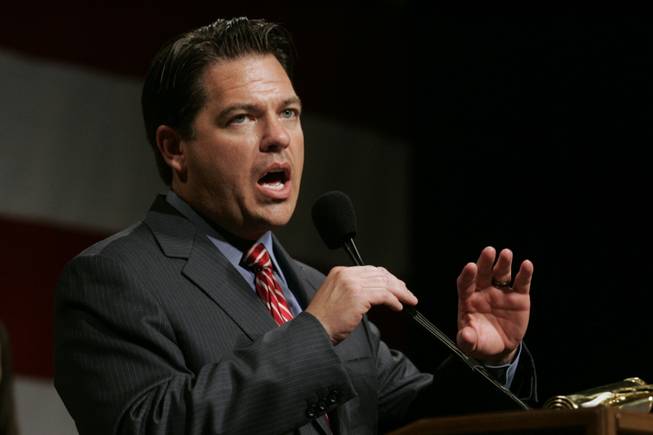
Senator-elect Michael Roberson speaks at the Republican election night party Tuesday, Nov. 2, 2010, at the Venetian.
Monday, May 6, 2013 | 4:53 p.m.
Sen. Michael Roberson released the details of his proposal today to double taxes on Nevada’s mining industry.
The 75-page bill that has details of the plan Roberson announced last month could raise $600 million for education programs and would compete on the 2014 ballot with a business margins tax that the state teachers union backs.
Roberson, a Republican from Henderson, and five other Senate Republicans said last month that their proposal will raise money to hire more teachers for class-size reduction, develop new English language learner programs, and establish an education stabilization fund. It would impose a 10 percent excise tax on large gold and silver mines — double the current 5 percent rate on mining — and would continue to funnel the same mining tax revenue to local governments collecting it now.
The initiative would only go into effect if legislators approve Senate Joint Resolution 15, a measure to remove the industry’s constitution tax protections, this year and voters approve it again at the ballot in 2014.
Roberson and the five GOP senators — Ben Kieckhefer, of Reno; Joe Hardy, of Boulder City; Greg Brower, of Reno; Scott Hammond, of Las Vegas; and Mark Hutchison, of Las Vegas — have so far faced a Legislature and governor largely skeptical about their proposal.
Four Republican senators are opposed to the plan, and so are Republicans in the state Assembly and Republican Gov. Brian Sandoval.
The state’s mining industry also opposes the bill, which they say will punish a single industry and eliminate well-paying jobs.
Roberson also still needs to persuade skeptical Democratic colleagues to pass the bill, which he says is far more palatable than the margins tax.
Meanwhile, Democrats are crafting their own taxation measures. Although Roberson invited Democratic lawmakers to help him draft the mining tax bill, his proposal currently stands alone as sole tax plan released thus far.
“I’m still waiting on what the Democrats plan to do,” he said.
Roberson’s plan could face legal challenges because it’s unclear whether the Legislature is still allowed to offer a competing measure on the ballot.
But Roberson tried to preempt these legal questions in his proposed legislation. The bill orders the secretary of state to put the plan on the ballot without allowance “for the exercise of any discretion or judgment.”
It would also bar “any pre-election court challenges seeking to prevent submission of this bill to the voters.”
While it’s unclear whether such measures would withstand legal scrutiny, voters will have at least one clear choice to make at the 2014 ballot.
They’ll choose to vote for or against the margins tax, which creates a 2 percent tax on business revenue alongside a temporary payroll tax increase on banks from 2 percent to 2.42 percent.
Roberson’s measure would also add a temporary payroll tax increase on banks, taking the rate from 2 percent to 2.5 percent.
The 0.8 percent is a vital distinction because it means the two measures conflict, potentially qualifying the mining tax measure to compete with the margins tax measure.
“If the mining tax initiative did not conflict with the education initiative, it wouldn’t replace it,” said Bill Uffelman, president of the Nevada Banker’s Association.
If Roberson’s measure passes, it will appear as the “Education Priority Act” on the 2014 ballot alongside the margins tax, which is called the “The Education Initiative.”

Join the Discussion:
Check this out for a full explanation of our conversion to the LiveFyre commenting system and instructions on how to sign up for an account.
Full comments policy